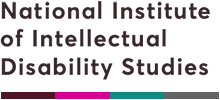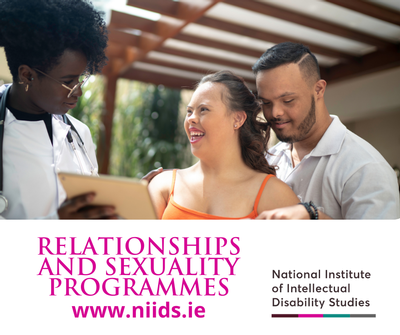Sexuality and Relationship Development Programmes
Sexuality and Relationship Development Programmes
This is one of a series of programmes was designed by the National Institute of Intellectual Disability Studies along with Dr Michelle McCarthy University of Kent Tizard Center to provide organisations and all those who work in them, with the values, attitudes, competence, knowledge and skills to support people with Intellectual disabilities with their sexual development and expression.
The programme draws on the findings from research we conducted in Ireland, into the real experiences of people with Intellectual disabilities. We asked questions about how they live their lives and what they think they need and want. The research was conducted by Martha McGinn under the supervision of Dr Hilary Brown. 40 service users, 40 parents and 40 staff were interviewed for this research.
We also reference some of the work from Supported Loving which is a comprehensive UK based website, devoted to supporting people with Intellectual Disabilities, to help them to navigate their way through all the complexities of relationships and sexual expression.
The programmes will provide insights into the lives of service users, their families and staff. Content includes values and attitudes to support individuals to explore their needs in relation to sexual development and sexual expression. Each of the programmes in the series are packed with thought-provoking case scenarios and questions and is designed to make learners think about the way they provide support and the changes they can make. These modules can be completed on your own for CPD or as part of a team or as directed through supervision.
This is 5 Units in this series :
- Unit 1 – Values, Attitudes and Barriers – Sexuality and Relationship Development
- Unit 2 Stages of Sexual Development and Relationship Building
- Unit 3 Rights, Responsibilities, Consent and the Law in Ireland
- Unit 4 Sexuality and Relationship Building Strategies for HSCP’S and PICS
- Unit 5 Sexuality and Relationship Building – Organisational Responses
The purpose of Units 1- 4 are to equip the HSCP’s with the knowledge, skill and competence to respond appropriately to sexuality issues that may arise in daily situations when working with individuals with intellectual disability. It will also encourage the HSCP’S and PIC’S in their role to reflect on attitudes towards the sexual development and sexual expression of individuals with intellectual disability.
Unit 5 is for registered providers and senior managers to consider how they can create a supportive environment and remove barriers to allow relationships to develop and flourish.
Unit 1 – Values, Attitudes and Barriers – Sexuality and Relationship Development
The content in this unit covers the following
- Define the term sexuality
- Communicate about sexuality using appropriate sexual language
- Discuss attitudes towards different forms of sexual expression
- Explain how attitudes towards sexuality and intellectual disability can impact on the lives of people with intellectual disability
- Evaluate the impact of one’s own attitudes towards sexuality and intellectual disability on the lives of individuals with intellectual disability
Unit 2 Stages of Sexual Development and Relationship Building
The content in this unit covers the following
- Outline the typical pattern of development of sexuality and sexual expression
- Identify the barriers to typical development of sexuality for people with Intellectual disability
- Recognise common myths about the sexuality of people with intellectual disability
- Describe the three levels of sexual behaviour:
- 1 Basic
- 2 Advanced
- 3 Intimate
- Discuss how additional physical and sensory impairments can impact on the typical development and expression of sexuality for people with intellectual disability
Unit 3 Rights, Responsibilities, Consent and the Law in Ireland
- Explain the issues of confidentiality and consent relating to sexuality
- Outline the legal position relating to sexuality and intellectual disability
- Discuss issues that can arise when working in partnership with families around sexuality issues and strategies for dealing with these
Unit 4 Sexuality and Relationship Building Strategies for HSCP’S and PICS
- List the four levels of the PLISSIT model
- Distinguish between issues that can be dealt with by front line staff and issues that need to be referred to specialists for higher levels of intervention
- Demonstrate the ability to plan an appropriate intervention involving Permission in response to a specific sexual issue
- Demonstrate the ability to plan an appropriate intervention involving Limited Information in response to a specific sexual issue
- Explain the four levels of intervention outlined in the PLISSIT model
- 1 Permission
- 2 Limited Information
- 3 Specific Suggestions
- 4 Intensive Therapy
- Discuss the role of front-line staff in relation to interventions involving Permission
- Explain the importance of sexual education for people with intellectual disability in relation to information sharing and protection from abuse
- Discuss the role of front-line staff in relation to interventions involving Limited Information
Unit 5 Sexuality and Relationship Building – Organisational Responses
- Evaluate the policies and practices of a given organisation in terms of the impact these have on the sexuality of individuals with intellectual disability
- Review organisational responses to identify barriers and produce a strategic plan in line with HIQA regulations and HSE PCP Framework mandatory requirements
- Encourage innovative ways of thinking in identifying efficiencies in organizing and managing a sexuality and relationship building programme
- Identifies cross-organisational resources and makes them available to meet sexuality and relationship building priorities
For more information contact Martha McGinn martha@marthamcginn.com



